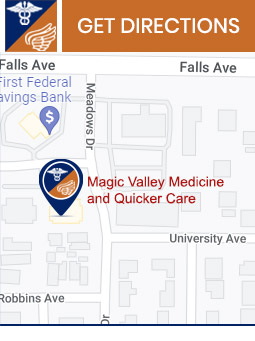Abscesses Treatment Clinic in Twin Falls, ID
At Magic Valley Medicine & Quicker Care in Twin Falls, ID, we specialize in prompt and effective abscess treatment. Our skilled team is dedicated to providing compassionate care, ensuring your abscess is treated quickly to alleviate pain and prevent further complications. Trust us for comprehensive and professional care tailored to your needs. Visit us for expert abscess treatment and experience the high-quality care you deserve. For more information, contact us today or schedule an appointment online. We are conveniently located at 844 North Washington St. Suite 200 Twin Falls, ID 83301.



Additional Services You May Like

Additional Services You May Like
- Walk-In Urgent Care
- Family Medicine
- Chiropractor
- Hormone Replacement
- Abscesses/Skin Infections
- Acute Fracture
- Allergies
- Back Pain Or Strains
- Bladder Infections
- Bronchitis
- Colds
- Cuts/Minor Lacerations
- Stomach Flu (Gastroenteritis)
- Semaglutide GLP-1
- Diarrhea
- Ear Infections
- Ear Wax Removal
- Eye Infections/Styes
- Fingernail/Toenail Injuries
- Hemorrhoids
- Flu
- Insect/Bee Stings
- Laryngitis
- Psychiatric Conditions (Depression/Anxiety)
- Sinus Infections
- Crush Injuries
- Knee Sprain
- Strep/Sore Throat
- Contusions
- Complex Non-Plastic Lacerations
- Eye Foreign Body/abrasions
- Minor Dislocations
- Wrist, Hand Sprains
- Swimmer’s Ear
- Sports Physicals
- Shoulder Sprain
- Ankle Sprain
- COVID Testing
- Tirzepatide
- Mounjaro
- Zepbound
- Pain Management for Chronic Pain






